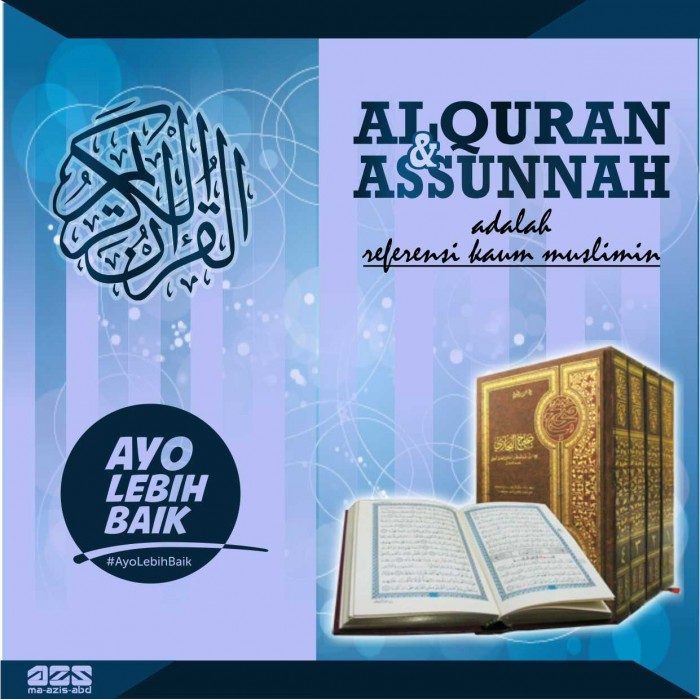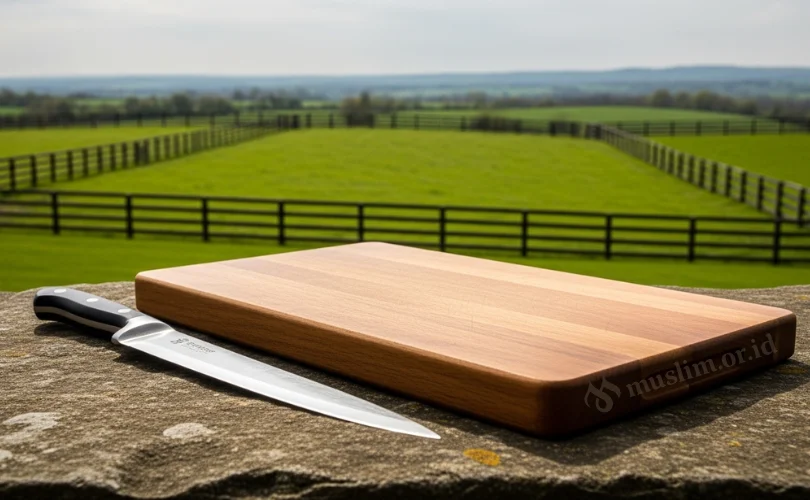As time and technology develops, the practice of slaughtering animals has experienced significant changes. In various modern slaughterhouses, slaughtering is often done mechanically with machines, using automatic equipment, even preceded by anesthesia or fainting before slaughtering. On the other hand, negligence or intentional arises in not mentioning the name of God during slaughter.
In this second article, we will discuss three important problems: (1) mechanical slaughter with the machine, (2) slaughter without mentioning the name of God, and (3) anesthesia before slaughtering.
Mechanical slaughter with the machine
The number of humans is increasing and the need for animals that can be eaten also increases in large quantities, thus making it difficult for the process of slaughtering and penggasianatan manually such as the old ways. Therefore, the slaughtering method also changed from the previous ways, along with the large number of animals that were slaughtered and ease of distribution. This requires the use of modern tools (machines), to speed up the slaughtering process. [1]
The scholars have gathered the condition of the massacre, which if they are fulfilled, and there are no obstacles; Thus the massacre is considered legal, and the animals of halal massacres are consumed. [2]
There are four conditions to be slaughtered to be considered legal in accordance with sharia:
First: Qualifications of massacres, which make sense and evil to slaughter shar’i. Then it is not legally slaughtered from children who are crazy, drunk, or small Mumayyiz, Because they have no valid intention (intention).
Ibnul Mundzir Rahimahullah said,
Everything we keep from the scholars in a round voice agreed to allow the sacrifice of women and boys
“All the scholars we know agree that the slaughter of women and young children who have Mumayyiz is halal. ” [3]
Second: Using sharp tools and can cut because of his sharpness, not because of its weight. Whether it’s from iron, stone, wood, or other than it, as long as it is not from bones or nails. This is an opinion agreed upon by the scholars about the validity of its slaughtering, based on the words of the Prophet sallallaahu ‘alaihi wa sallam In the hadith Rafi ‘bin Khadij,
What is the blood river and the name of God and the name of God, in Him, is not age and nail
“Whatever can drain blood and called the name of God to him, then eat. Except teeth and nails.” (HR. Bukhari no. 2488 and Muslim no. 5065) [4]
Third: Cut Al-Healqūm (throat, namely airways), Al-Mari ‘ (esophagus, namely food and beverage channels), and one of two Wadajain (two veins in the neck, namely large blood vessels).
Fourth: Massacre speaks Bismillah (On behalf of God) When moving his hand to slaughter, based on the word of God Tap,
And don’t eat from what is not mentioned by the name of God, and it is immoral
“And do not eaten (animals) that are not called the name of God on it, because actually it is wicked up.“(Surah Al-three: 121) [5]
However, the scholars disagree about the validity of slaughter without mentioning the name of God, which will be explained in the following sub -chapter:
Massacre without mentioning the name of Allah
Sheikh Muhammad bin Salih al-‘utsaimin said, “This problem-that is about mentioning the name of God when slaughtering or when hunting-was disputed by the scholars in several opinions:
First opinion: Mentioning the name of God is not required to be slaughtered or hunting, but only sunna. They bite with an invalid hadith:
The sacrifice of a Muslim is permitted, even if the name of God is not mentioned on it
“A slaughter of a Muslim is halal even though he does not mention the name of God over him.”
Second opinion: Mention the name of God is mandatory, but fall if it is forgotten or not knowing, both in slaughter and in hunting.
Third Opinion: Mentioning the name of God is a condition in slaughtering and hunting, but falls because it is forgotten in slaughtering, does not fall in the hunt. This is a famous opinion among the circles Fuqaha Hanabilah.
Fourth opinion: Mentioning the name of Allah is a condition in slaughtering or hunting, and does not fall because it is forgetting or because he does not know. This is the opinion of Sheikhul Islam Ibnu Taimiyah Rahimahullahand is the most powerful opinion based on existing arguments. [6]
In another place, he mentioned the argument, saying, “Mentioning the name of Allah (Basmalah) When slaughtering is a legal requirement for slaughter. He did not fall – both because of deliberate, forgotten, or because he did not know – because he was a condition, and the conditions did not fall either intentionally, forgetting, or because of ignorance. This is because of Allah Story said,
And don’t eat from what the name of God is not mentioned
‘And don’t eat (animals) that are not called the name of Allah on it.’ (Surah Al-An’ām: 121)
In that verse, God said (which means) ‘The name of God is not mentioned on it’, without limiting whether abandoned intentionally or because of forgetting. ” [7]
Anesthesia before slaughter
Along with the need for slaughtering in very large amounts, began to be found and used electric devices to electrocate animals before being slaughtered. This issue has been reviewed by fiqh institutions, including the fiqh council which is under the auspices Rabithah Islamic Traits, In the 10th trial held in Makkah, starting on Saturday, 24 Safar 1408 to Wednesday, 28 Safar 1408.
The trial issued a decision by setting several conditions so that the slaughter was considered valid, namely:
First: If the animal that can be eaten is electrocuted with an electric current, then slaughtered or stabbed (Natr) In a country that is still alive, the massacre is legally and valid to be eaten, based on the word of God Tap,
Except you
“Except for what you had slaughtered …” (Surah Al-Mādah: 3)
Second: If the animal spirit is lost (dead) because the strokes before they could be slaughtered, then the status is the carcass and haram is eaten, because of the generality of the word of God Tap,
Death is prohibited for you
“Forbidden for you carcass …” (Surah Al-Mādah: 3)
Third: If the electric current used is low, lightweight, and not torturing animals, and there are benefits – such as alleviating pain when slaughtered or calm animals so as not to fight -, then it is allowed syar’i by considering the benefit.
Mentioned in the decision Majma ‘Fiqh Islamic International, which is under the auspices of the organization of the Islamic Conference, Decree Number 94 (3/10), in the discussion about the slaughter of poultry, that:
Poultry may not be strengthened by electric shock; Because the experiment was proven from this distance to the death of an uninterrupted percentage before smart
“It should not be anesthetizing poultry with an electric stun, because it is proven from the experiment that most of the poultry died before being slaughtered by syar’i.”
The decision also contains several technical requirements related to the use of electrical devices for anesthesia before slaughter. For those who want to know more, please refer directly to the decision document. [8]
Thus the discussion of three contemporary problems surrounding animal slaughter: (1) mechanical slaughter with the machine, (2) slaughter without mentioning the name of God, and (3) anesthesia before slaughtering. Wallahu a’lam bish showab.
In the third article, Willing God Two other important things will be discussed: the law of meat imports from non-Muslim countries and answers to the criticism of animal activists about slaughtering in Islam.
[Bersambung]
Back to section 1
***
Rumdin PPIA Sragen, 2 Safar 1447
Writer: Prasetyo Abu Ka’ab
Article Muslim.or.id
Main reference:
Al-Fauzan, Salih bin Fauzan. Al-Mulakhkhshh al-Fiqhi. Egypt: Dar al-‘aqidah, 2009.
Al-Muthlaq, Abdullah bin Muhammad. Al-Fiqh Al-Muyassar: Pat. Fourth edition. Riyadh: Madarulul Wathan, 1439 /
Footnote:
[1] Al-Fiqh Al-Muyassar, 13: 38.
[2] Look Syarh Nadzm Al-Qowa’id Al-Fiqiyyahmatter. 49.
[3] Al-‘Auddah Syarḥ al-‘umdahmatter. 447. Nucked from Al-Fiqh Al-Muyassar, 7: 17.
[4] Al-Fiqh Al-Muyassar, 7: 17.
[5] Look Al-mulakhkhsh al-ffqhi, 2: 430-432.
[6] Summarized from Syarḥ Al-Mumti ‘ala Zād Al-Mustaqni’, 7: 445-446.
[7] Syarḥ Al-Mumti ‘ala Zād Al-Mustaqni’, 7: 443.
[8] Extracted from Al-Fiqh Al-Muyassar4: 120-121.
[9] Al-Fiqh Al-Muyassar, 13: 38.
Game Center
Game News
Review Film
Rumus Matematika
Anime Batch
Berita Terkini
Berita Terkini
Berita Terkini
Berita Terkini
review anime



